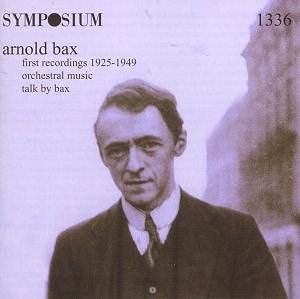In one fell swoop Symposium document for our
discovery and delectation all Bax's early orchestral recordings.
This is the first time that the Goossens-conducted
items and Mater Ora Filium have appeared on CD ... or LP for that
matter.
Excepting Tintagel and Mater Ora Filium
this selection encompasses the lighter Bax. His discography
up to the 1960s was dominated by works that were far from profound.
One accordingly gains from this collection a skewed picture of
Bax the composer. On this basis one would wonder whether he was
predominantly a purveyor of slender charm. The symphonies would
take you by surprise.
The Goossens Tintagel has been a favourite
of mine since I was sent a cassette transcription back in the
1980s. Goossens’ control of the pulse is with a rod of iron. He
is another Mravinsky at least at that stage in his career.
His BBC broadcast of the Second Symphony (circa 1956) showed that
his gripping way with the best of Bax's music had not diminished
over the intervening years. Mediterranean was done rather stiltedly
and with marginally more yield by Hickox. This Goossens version
lilts irresistibly. It is however very light Bax and the Harty
overture is also hardly a profound piece. The choral piece Mater
Ora Filium impresses by the monumental tone of the massed
choir. More recent recordings sound under-strength by comparison.
It is fashionable to write off Morning Song.
Certainly it is no Winter Legends nor even a Saga
Fragment. However it is a triumphant example of a light lyric
concert piece that is light on the palate and scored with innocently
lucid accomplishment. It recalls Macdowell's Woodland Pictures
as well as touching on the carefree Delius. There is even
a momentary reference to Lambert's Rio Grande. The Oliver
Theme, also with Harriet Cohen, is cut from similar cloth.
From Malta G.C. the Gay March is a pleasant effusion being
inoffensive and a touch rum-ti-tum jolly rather like the Korngold
March of the Merry Men from the 1930s Warner Bros film
of The Adventures of Robin Hood. The other film music is
pleasing but its charms are slender even in these capable hands.
The fanfares were written both before his elevation
to be Master of the King's Music and after. They are shatteringly
well done and real virtuosity is delivered by the crack Kneller
Hall players in the 1932 recording. They would have made real
hay with Janáček's Sinfonietta
... if only.
The notes are, of course, by Lewis Foreman and
the project would not have been possible but for his collection
and those of Graham Parlett, Stephen Lloyd and Warwick Round.
A fascinating and generous document preserving
recordings of performances made within twenty years of the works’
premieres. More for the specialist but anyone at all drawn to
Bax will want this - not east for a unique Tintagel and
a profound Mater Ora Filium.
Rob Barnett

